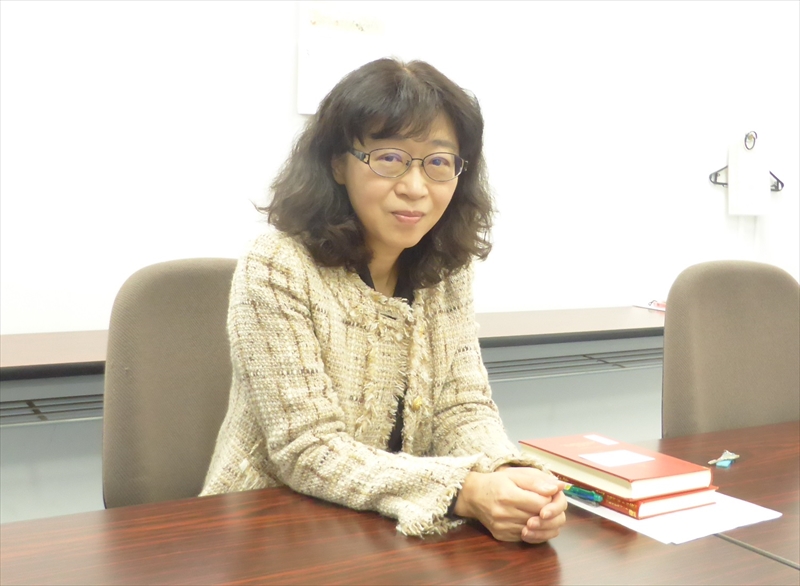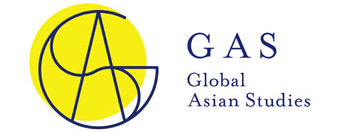An interview with Professor Matsui Yoko of the Historiographical Institute, the University of Tokyo
Yijiang Zhong (Institute for Advanced Studies on Asia)

First, could you briefly tell us about your research?
I study the early modern period of Japan which is also known as the Edo period. Japan in the Edo period was characterized as a highly controlled “secluded country” but actually there were exchanges with foreign countries. My research focus on these exchanges. Because I had the opportunity to study Dutch, I have been looking at Japan-Dutch relations that transpired at the Dejima island of Nagasaki. The Historiographical Institute of the University of Tokyo conducts and publishes research on Japanese history and historical source materials. As a member of the Institute I am in charge of compiling the diaries written by the head of the Dutch TradingPost in Nagasaki. I examine source materials in both Japanese and Dutch and see how they differ from each other. I have always felt it is insufficient to look at only domestic Japan even for study of Japanese history. So I was glad to join the Global Japan Studies network when it was created. I am equally interested in participating in the New Global History project initiated by Prof. Masashi Haneda as I feel it strange that no scholars in Japanese history took part in this project.
There are a wide range of research about Japan at the University of Tokyo but you probably cannot find something specifically called “Japanese studies” at Japanese universities. People categorize their research in terms of modern Japanese society, economy, and so on. As a result, we don’t usually have a comprehensive image and don’t know about how people in other fields think and conduct research. The GJS network is very helpful in facilitating a venue to know about research different from one’s own.
It is a common problem that our research is becoming overly specialized. In connection to this problem, research on Japan has been conducted and presented in Japanese. These practices may appear natural but they have their own limits. It is necessary to go beyond these practices.
Actually, what’s called Japanology or Japanese Studies originated in certain old and renowned European universities in the mid-19th century. Now many of them have become East Asian Studies or Asian Studies departments. There are many Japanese specialists there and they have high command of the Japanese language. Foreign researchers at the Historiographical Institute likewise are able to read old Japanese texts. Thanks to these researchers, we Japanese historians don’t feel the need to present our research in foreign languages. Recently more and more Japanese scholars are going overseas but when they visit places of Japanese studies or Japanese history they usually use Japanese without stepping outside the world of Japanese. This is a problem.
With regard to Japanese history, there may be differences between scholars in Japan and those overseas in terms of research style and perspectives. If Japanese scholars of Japan do not present their research in foreign languages, they may remain unknown overseas. It is however easier said than done. As long as I started translating papers into English for publication, I realized how difficult it was. Yet I don’t think we should give up. It is an unfortunate situation that scholars in Japan and overseas conduct research separately and differently without knowing about each other. It is such a waste that the rich research by Japanese scholars is not made known overseas.
While there are many reasons for this sad situation, one reason is that we tend to present our research in Japanese which is both the language of our subject materials and the language of the society where we do research. So we end up presenting our research using expressions from source materials. For example, I use terms that appear in documents of the Edo period either in the form of quotations or to express ideas that have added meanings. These terms, however, become difficult to explain when I attempted to translate or talk about them with foreign researchers. I realized that we have been communicating our research through tacit understanding rather than logical explanation. There are many things that we missed and did not realize. In this sense, it is important to step outside our mother tongue even just for the purpose of expressing and transmitting ideas more exactly and correctly. It is an ideal and there are many difficulties. In many cases there are simply no corresponding translation because languages denote different ways of thinking.
My work deals with Dutch hand-written documents from the 17th century. I transcribe these documents and translate them into Japanese. It is difficult work because it involves not just change of language; behind the language is difference in ways of thinking. The gap between different ways of thinking is fascinating. I can see how people make mutual adjustments in timing during diplomatic and economic exchanges. I feel straddling more than two languages and more than two cultures increases the breadth of one’s way of thinking. In this sense too, it is important to conduct and exchange Japanese studies in multiple languages.
This is why I think it important to build up the network for people who share the sense of necessity of constructing the Global Japan Studies. I look forward to meeting, discussing with, and learning from other scholars at the GJS network. With this goal, I entered my name in the member list. There are however many people who don’t think foreign languages necessary for studying Japan and Japanese history. It is interesting to note in this regard that classical Chinese (kanbun), even when it appeared in texts written in China, was not regarded as a foreign language especially by scholars of earlier generations. Collections of source materials compiled by the Historiographical Institute also adopted this view of the Chinese language. Chinese classical texts were read as kanbun in the Japanese style. Now things have changed. We need to make efforts to adopt the practice of reading Chinese as a foreign language. When I heard that you came to join the Global Japan Studies, I thought your presence really reflects the fundamental fact that Japanese Studies can’t be conducted just by Japanese any more.
Thank you very much. It is a learning experience to hear your observations and impressions which are new to me. You must have a lot of experience traveling overseas. How do you look at Japanese studies overseas in comparison with Japanese studies in Japan?
I don’t have that much experience but I sense a difference in method and perspective between Japanese studies in the U.S. and Europe and that in Japan. Talking about historical studies, in any country how history is learned and studied will shape how foreign countries are studied in that country. It may be difficult to talk about things based on the distinction of Japan and non-Japan but in general there is a difference which we can describe as degrees of magnification, difference between looking from afar and looking very closely. So while in Japan people don’t say they are a specialist of Japan, people studying a foreign country’s history will cover the entire history of that country, from ancient period to the present. This is a difference in degree of magnification, difference between looking in large scales from outside and looking in small scales from within.
Japanese specialists overseas may read studies written in Japan and they may understand these studies from perspectives completely different from those of Japanese scholars regardless whether they properly understand the content and whether they adopt that understanding. In the case of Japanese history, research in Japan is extremely minute. It is necessary to take care of details in quotation and explanation of sources. This is important but in many cases because too much focus is placed on details, it becomes difficult to distance oneself from them. Whether we call it scaling down or magnification, I think there is such a difference. This of course do not mean that we can be careless about those details. Some foreign researchers can read details.
Finally, please share your opinions and advice on constructing the Global Japan Studies.
I don’t know if I can offer opinions or advice. I do look forward to the GJS becoming a space of contact where different kinds of information is available. Both faculty and students are busy and may not be able to contribute a lot. I am grateful for receiving the information of lectures etc. from the GJS. And you are publicizing the information on website as well? I hope as your efforts accumulate people will start thinking about the GJS as a source of information. Also, other than faculty members, it is important to develop this consciousness in undergraduate and graduate students by organizing lectures for them because in the real sense the Global Japan Studies will have to be succeeded by the next generation and then the next after that.
How do you think we can make appeals about the GJS to faculty members who because of their busy schedules can’t participate in the GJS so far?
Many people may be aware that studying Japan only in Japanese is very self-restricting but they may also feel resistance to the idea that change to English will be great. Some say English is not omnipotent and some others think this is English imperialism. A lot of people think it is easier to do things in Japanese. The GJS needs to show people what is interesting beyond studies of Japan in Japanese only and by Japanese scholars only. Of course what is interesting differs from one person to another but it is important to make people think “I want a little more” because as you know research can’t be forced and scholars conduct research because they want to do it. Appeal to norms or duties won’t make people change.
These are valuable observations. We will work toward making Todai faculty feel the GJS is interesting. Now, I would like conclude today’s interview. Prof. Matsui, thank you very much.



